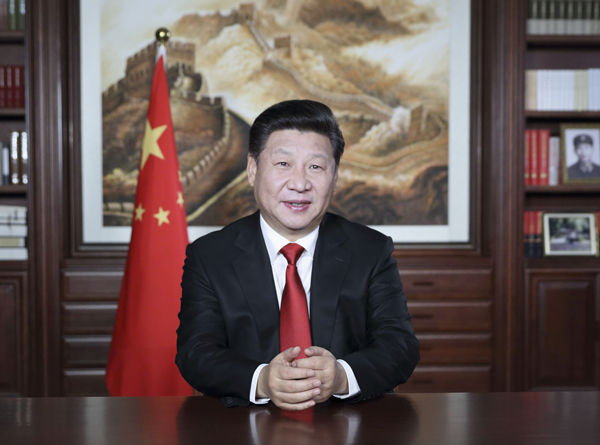By Xuefei Chen Axelsson
Stockholm, Dec. 31(Greenpost)–As a tradition since 2001, Chinese President sends New Year’s greetings to Chinese people home and abroad and friends all over the world through China Radio International, China National Radio and China Central Television Station.
The following is the whole text translated by Xuefei Chen Axelsson, Chief editor of Green Post:

After a couple of hours, the New Year’s bell will toll. We shall say goodbye to 2015 and welcome the first ray of sunshine of 2016. At this moment, I would like to say New Year blessings to you, people of all ethnic groups in the whole nation, to compatriots in Hong Kong Special Administrative Region and Macao SAR, to Taiwan compatriots and compatriots overseas, to all friends from all countries and regions in the world! Happy New Year!
No pains, no gains. In 2015, Chinese people made great efforts and harvested a lot. China’s economic growth continutes to rank the first in the world, reforms have begun in almost all fields, reform in judicial system continues to be deepened, the “three stricts and three solids” thematic education has improved the political ecology, the anti-corruption struggle continues to deepen. Through the joint efforts of the Chinese people of all ethnic groups, the 12th five-year plan has successfully ended with a sense of fulfillment in some sense for the vast masses.
This year we held a grand celebration on the 70th anniversary of victory in Chinese people’s anti-Janpanese War and the World’s anti-Fascist war. We held a grand military parade showing the truth that justice shall win, peace shall win and the people will win. We have implemented a comprehensive reform strategy to consolidate our military strength and announced that we shall cut our military personnel by 300 thousand. I have met Mr. Ma Yingjiu in Singapore and shaken hands with him after 66 years, showing that the peaceful development across the Taiwan Strait is the common will of our compatriots on both sides of the strait.
This year Beijing won the rights of hosting the 24th Winter Olympics and the RMB was included in the SDR basket of IMF. The assembling line of C919 airplane developed by Chinese has been in operation. China’s super computer broke the world record and won its sixth consecutive championship. Dark matter exploring Satellite developed by the Chinese scientists has been launched into the universe. Tu Youou became the first Chinese scientist who won the Nobel Prize…these all prove that as long as we are persistent, our dreams will be realised sooner or later.
This year we had joy, but we also had sorrow. The accidents such as the capsized Oriental Star passenger ship in the Yangtze River, the most serious explosion at the Tianjin Port and the landslide in Shenzhen have deprived many compatriots’ lives, let alone the dreadful incident that quite a few compatriots were cruelly killed by terrorists. We missed them, may them rest in peace and may the alive healthy.There are still some difficulties and irritations in the lives of the masses. The party and government are determined to continue to make efforts to guarantee the safety of people’s lives and property, improve people’s living standards and health.
2016 is the first year of the decisive period China enters to build comprehensive wealthy and healthy society. The 5th session of the 18th plenary session of the Communist Party of China has set up clear directions for the development in the following five years. The prospect is encouraging and inspiring, but the happiness doesn’t come from the sky. We should be confident and continue to make efforts in implementing the development concept of being innovative, harmonious, green, open and sharing, pushing forward the structural reform, pushing forward reform and opening up, and doing our best to promote equity and justice and create clean and transparent political environment to make a good start for the decisive period of building comprehensive wealthy healthy society.
To build comprehensive wealth and healthy society, it needs the joint efforts of the 1.3 billion people. It is my great concern to improve the living standards of the hundreds of thousands of poor people in the rural areas.
We have blown up the trumpet to win the campaign of poverty alleviation. All the party members and the people of all ethnic groups should join hands in the battle to ensure that all the poor people should alleviate their poverty as scheduled. We should take care of all the people who have difficulties so that they can feel the warmth from their inner heart.
We only have one earth, and it is the common home of all the people in all nations. This year, Chinese leaders participated in many international conferences, conducted many diplomatic activities, pushed forward some tangible progress in the construction of “one belt and one road”, participated in the United Nations 2030 sustainable development agenda and the Paris Climate Change Conference. The world is large and problems are many. The international community anticipated to hear China’s voice, see China’s solutions and China cannot be absent. We should not only have empathy and be sympathised with those who are suffering from difficulties and war fires, but also take responsibility and action. China will forever open its heart to the world and stretch her hands to those who are in difficulty so that our “friends circle” will be larger and larger.
We sincerely hope that the international community will make joint efforts to have more peace and cooperation, change the antagonism into cooperation, replace the spears with the silk, jointly build a human community jointly owned and shared by the people of all nations.
Thank you all.
新华社12月31日电:国家主席习近平通过中国国际广播电台、中央人民广播电台、中央电视台,发表了二○一六年新年贺词。全文如下:
再过几个小时,新年的钟声就要敲响了。我们即将告别2015年,迎来2016年的第一缕阳光。在这辞旧迎新的时刻,我向全国各族人民,向香港特别行政区同胞和澳门特别行政区同胞,向台湾同胞和海外侨胞,向世界各国和各地区的朋友们,致以新年的祝福!
有付出,就会有收获。2015年,中国人民付出了很多,也收获了很多。我国经济增长继续居于世界前列,改革全面发力,司法体制改革继续深化,“三严三实”专题教育推动了政治生态改善,反腐败斗争深入进行。经过全国各族人民共同努力,“十二五”规划圆满收官,广大人民群众有了更多获得感。
这一年,我们隆重纪念了中国人民抗日战争暨世界反法西斯战争胜利70周年,举行了盛大阅兵,昭示了正义必胜、和平必胜、人民必胜的真理。我们全面实施改革强军战略,宣布裁军30万。我和马英九先生在新加坡会面,实现了跨越66年时空的握手,表明两岸关系和平发展是两岸同胞的共同心愿。
这一年,北京获得第24届冬奥会举办权,人民币纳入国际货币基金组织特别提款权货币篮子,我国自主研制的C919大型客机总装下线,中国超级计算机破世界纪录蝉联“六连冠”,我国科学家研制的暗物质探测卫星发射升空,屠呦呦成为我国首位获得诺贝尔奖的科学家……这说明,只要坚持,梦想总是可以实现的。
这一年,我们有欣喜,也有悲伤。“东方之星”号客轮翻沉、天津港特别重大火灾爆炸、深圳滑坡等事故造成不少同胞失去了生命,还有我们的同胞被恐怖分子残忍杀害,令人深感痛心。我们怀念他们,愿逝者安息、生者安康!群众的生活中还有一些困难和烦恼。党和政府一定会继续努力,切实保障人民生命财产安全、保障人民生活改善、保障人民身体健康。

↑新年前夕,国家主席习近平通过中国国际广播电台、中央人民广播电台、中央电视台发表二〇一六年新年贺词。新华社记者兰红光摄
2016年是我国进入全面建成小康社会决胜阶段的开局之年。中共十八届五中全会明确了未来5年我国发展的方向。前景令人鼓舞、催人奋进,但幸福不会从天降。我们要树立必胜信念、继续埋头苦干,贯彻创新、协调、绿色、开放、共享的发展理念,着力推进结构性改革,着力推进改革开放,着力促进社会公平正义,着力营造政治上的绿水青山,为全面建成小康社会决胜阶段开好局、起好步。
全面建成小康社会,13亿人要携手前进。让几千万农村贫困人口生活好起来,是我心中的牵挂。我们吹响了打赢扶贫攻坚战的号角,全党全国要勠力同心,着力补齐这块短板,确保农村所有贫困人口如期摆脱贫困。对所有困难群众,我们都要关爱,让他们从内心感受到温暖。
我们只有一个地球,这是各国人民共同的家园。这一年,我国领导人参加了不少国际会议,开展了不少外交活动,推动“一带一路”建设取得实质性进展,参与了联合国2030年可持续发展议程、应对全球气候变化等国际事务。世界那么大,问题那么多,国际社会期待听到中国声音、看到中国方案,中国不能缺席。面对身陷苦难和战火的人们,我们要有悲悯和同情,更要有责任和行动。中国将永远向世界敞开怀抱,也将尽己所能向面临困境的人们伸出援手,让我们的“朋友圈”越来越大。
我衷心希望,国际社会共同努力,多一份平和,多一份合作,变对抗为合作,化干戈为玉帛,共同构建各国人民共有共享的人类命运共同体。
谢谢大家。


